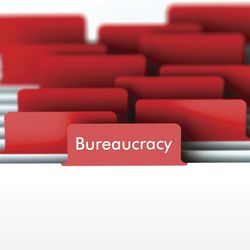
It has done this by eliminating friction in how things are bought and sold. The store is now open 24-7. You no longer go to a travel agent. You may not have an insurance agent. Banking is an app. The process has accelerated this decade, with the rise of cloud-based apps.
But some industries have remained stubbornly resistant to change. The law, health care, and education are all protected, ringed really, by powerful bureaucracies that prevent reform in the name of the law.
Government can produce bureaucracy, but private bureaucracies can be fiercer and more intractable. Once you have people whose jobs are being defined as internal to the organization, you have bureaucracy. Even a one-man band like me has bureaucracy. My accountant is part of my bureaucracy. If I had a personal assistant – if I could afford one – I would have a bigger bureaucracy.

The most powerful and necessary bureaucracies have the force of law behind them. I have an accountant as much to comply with the tax law as to keep my personal finances operating. Tools like Square, QuickBooks and Gusto can replace some of the work, but switching to them is subject to Moore’s Law of Training, and there is no Moore’s Law of Training. We learn only as fast as we learn.
While TechLand can nibble around the edges of personal bureaucracy, it is helpless before the law. The impact of technology on the law has been to actually increase employment, not cut it, because cases expand to fit the amount of data brought to them. Judges who once made decisions based strictly on legal precedent now have to wade through mountains of data brought forth by both sides, aimed at arguing that the precedent does not matter, and that each case is unique. Cases cost even more to settle than before, more money, more people, and more time.

The degree-granting process is filled with bureaucratic minutiae, all of which must be handled face-to-face, in interminable meetings. What shall be taught? How shall it be taught? What shall be tested? How shall it be tested? How is the student proceeding through this “curriculum?” Are the bills being paid? Is the campus being maintained? How can we get more budget authority, more tuition money, and more government aid?
None of these questions are relevant to the actual goal of education, which is turning out educated, or at least trained, people. They’re all directed inward, to the growth and maintenance of the institution, toward bureaucratic goals. It doesn’t matter whether we’re talking about a public elementary school or privately-run Rice University, bureaucracy is everything, and technology seems powerless against it.
TechLand leaders are concerned about this, but when they try to enter the fray they’re bound like Gulliver in Lilliput to demands over curricula, or progress measurements, or comparisons with bureaucratically-run schools. Mark Zuckerberg tried to improve Newark schools with $100 million, but now admits he wasted his money.

Best practices can combat this, but only if data is allowed to drive what the best practice is. Data, however, can be manipulated. Data can be argued against. We can all go to court and enjoy that bureaucracy for a while, on any health care question.
The political problem facing TechLand is that all these bureaucracies mean employment. For millions. The bureaucrats in the law, in medicine, and in education have seen what has happened to their fellows in other industries, and are determined not to let that happen to them. Thus every effort at reform is thwarted. My kids learned the same way I did, in classrooms, with teachers lecturing them and standing over them as they took tests. The only difference was that while I watched film strips, they watched a lot of TV. For people without the patience for minutiae, like my son, or who needed extra drill to read, like my daughter, the result was frustration, waste, and abuse heaped on them by bureaucrats who cared only about their credential-producing systems and nothing for the victims of their shenanigans.
The solution, for TechLand, is to create demand for trained people in other ways. The profits of TechLand need to be recycled. They can be. Into infrastructure, into new services, into better food, and into protecting the environment.
But TechLand has to stand up for those jobs, and for getting the money to hire those people, if it is to stand a chance in the growing debate over bureaucracy. TechLand’s problems these days are increasingly political, and that is the bureaucrat’s turf.










